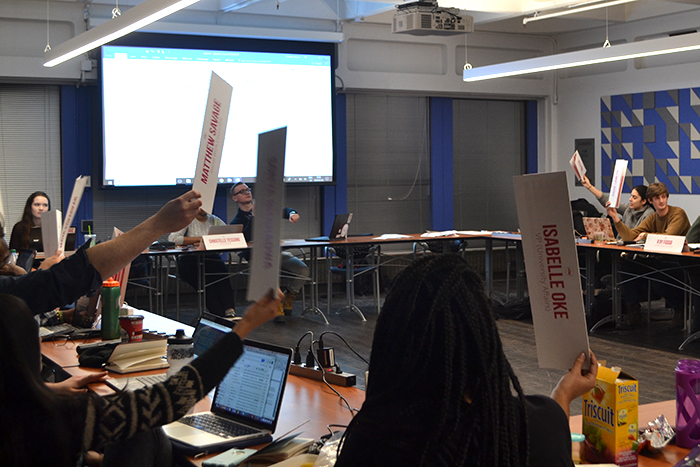At its March 15 meeting, the Students’ Society of McGill University (SSMU) Legislative Council passed the Motion Regarding the Policy for the Implementation of a Fall Reading Break, renewing SSMU’s mandate to lobby for the institution of a Fall break at McGill. Council also passed the Motion Regarding the Joint Board of Directors and Legislative Council Special Committee on Anti-Semitism, enacting the committee’s various recommendations to combat anti-Semitism on campus. Senior Director, Planning and Resources Diane Koen and Trenholme Dean of Libraries C. Colleen Cook also presented more information about the Fiat Lux library project.
McGill librarians discuss Fiat Lux project
The Fiat Lux library construction proposal, currently in its planning phase, proposes renovations to the Redpath and McLennan Libraries to fit the modern needs and desires of McGill students. The project leaders for the creation of a “library of the mid-21st century” informed Council of the project’s current status and on soliciting feedback from the student population.
“This project really is about students and your needs,” Cook said. “So we want to hear from you […and] get some of your input.”
Cook and Koen spoke about planned improvements to the library such as better lighting and air conditioning, greater selection and flexibility for individual and group study spaces, and additional seating.
“The whole thing, in the best of all possible worlds, [would be finished] within five to six [years],” Cook said.
Fall Reading Break motion goes to referendum
The motion resolved to continue the Society’s push for implementing a Fall break. It would renew SSMU’s stance on the issue and mandates the Vice-President (VP) External, VP University Affairs (UA), and members of the Senate Caucus to lobby the provincial government, administration, and Senate to establish a Fall Reading Week at McGill.
“[This composition] implements a three-pronged approach,” Bryan Buraga, the incoming Arts and Science senator and a representative from the motion’s “yes” campaign, said. “[As a result,] this would apply the maximum amount of pressure in order for this to be implemented.”
After acknowledging the need for special considerations for certain faculties such as Engineering—whose professors must lecture for a certain number of hours per semester as mandated by the Ordre des ingénieurs du Québec—and Medicine, which doesn’t have two-semester academic years, Council passed the motion to be voted on as a referendum question during the Winter 2018 voting period.
Recommendations from the Special Committee on Anti-Semitism passes
After a presentation from a member of the committee, Council deliberated a motion to enact each of its recommendations. These include renewing the committee’s mandate for the 2018-2019 academic year, adopting a working definition of anti-Semitism, and having new SSMU executives undergo a mandatory training session on anti-Semitism. The committee also recommended additional mandates for the VP UA, including hiring a special researcher on anti-Semitism on campus, organizing open workshops to educating students on relevant issues, and working with the McGill administration to implement their recommendations.
The proposed definition of anti-Semitism, one of the motion’s two clauses that passed through the committee without consensus but was addressed by a footnote within the motion, drew the most attention from Council. The motion proposes adopting the European Union’s (EU) Fundamental Rights Agency’s (FRA) working definition of anti-Semitism, though no such definition currently exists. In 2013, the FRA controversially removed an unofficial working paper from its website that included a “working definition of anti-Semitism” which many had taken to be the EU’s official working definition of anti-Semitism.
“Antisemitism is a certain perception of Jews, which may be expressed as hatred toward Jews,” the definition read. “Rhetorical and physical manifestations of antisemitism are directed toward Jewish or non-Jewish individuals and/or their property, toward Jewish community institutions and religious facilities.”
One councillor raised concerns about the definition potentially being too broad.
“As […] someone that is pro-[Boycott Divestment Sanctions] BDS, I’m a little worried that I will automatically be labelled as anti-Semite under this definition, without it being fully explained in the section,” Social Work representative Matthew Savage said.
Shira Mattuck, a committee member from Chabad McGill, reasoned that considering the committee’s composition and the included footnote, the proposal should not be modified.
“It’s really important to understand that these clauses were voted on by a majority of Jewish groups on campus,” Mattuck said. “It’s really important that we hear the lived experiences of Jewish students on campus and let Jewish students define anti-Semitism, and I think that [those concerns] are valid, but they are addressed in the footnote.”
After adding a friendly amendment for the committee to revisit its terms of composition during the Fall 2018 semester, Council passed the motion.








